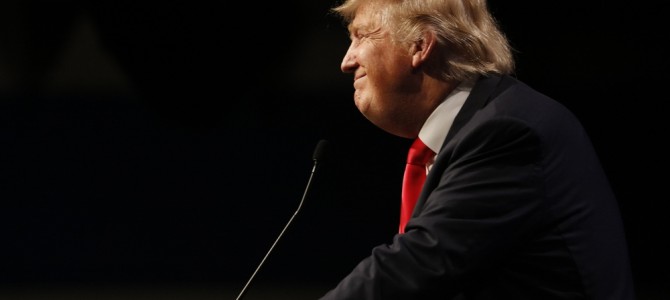
As the Republican Party careens toward civil war, Republican National Committee Chairman Reince Priebus got onstage to sing “Kumbaya” at the most recent debate in Miami. Claiming to speak not only for the Republican Party but also for “the conservatives, the Tea Party, our entire wonderful group of people,” Priebus promised that all would “come together and unify in Cleveland and get behind [our] nominee. That’s what we do as Republicans.”
Indeed, that’s exactly what the Republican Party has traditionally done. Year after year, the party has told grassroots conservatives we have to fall in line and support whatever milquetoast candidate the party nominates—the Doles, the McCains, the Romneys. Not to do so, they told us, would amount to heresy, treason, and what’s worse: a de facto vote for a Democrat.
But now Donald Trump is here, borne of the GOP’s fecklessness, and the party is fracturing. Even as Trump rides a wave of Independents and disaffected Democrats, lifetime Republicans and true believers in limited government are preparing to jump ship. The #NeverTrump movement is growing, bringing together a motley crew of defense hawks, social conservatives, constitutionalists, and libertarians—all vowing not to vote for Trump in November.
In fact, the only good thing about this election is that, as a libertarian-leaning conservative who often bucks the system and votes third party, I finally have some common ground with my more traditional Republican friends. Maybe that’s also why I’m finding it easier to chart my own course should Trump secure the nomination.
Like my traditional Republican friends, I’m heartsick at the prospect of Trump representing the party that supposedly stands for liberty. But unlike them, I’ve been here before. I’ve looked at a Republican versus Democrat presidential ticket and known that my only real choice was “none of the above.” In fact, hardly an election has gone by where I haven’t had to weigh the long-term goal of keeping conservatism alive against the short-term goal of keeping someone truly awful out of power.
These aren’t easy questions. Everyone has his own threshold for when a candidate becomes too evil to be considered “the lesser of two,” and this article is not meant to explore where that line should be drawn. If you’re on the fence about #NeverTrump, I’d direct you to the compelling arguments made by Sen. Ben Sasse, Erick Erickson, and Tom Nichols, among others.
No, I’m writing to those of you who are already convinced you could never vote for Trump, even to spare America from Hillary Clinton—but you’re feeling conflicted about “sitting this one out.” You’re the people I’ve seen writing agonized comments on Facebook, saying “if Trump gets the nomination I will stay home on Election Day, weeping and praying.” My message to you is simple: you don’t have to sit this one out.
While praying is always advisable, for heaven’s sake, don’t stay home. Your vote and your involvement are needed now more than ever—but in different places than you might think.
Remember the Down-Ticket Races
First, let’s talk about “staying home.” I presume that when people say this, they mean one of two things: either they will vote, but will leave the presidential race blank, or they won’t vote at all. While the former may be an option (more on that in a moment), there’s really no excuse for the latter decision.
I couldn’t disagree more with the final conclusion of this recent Federalist piece: “If the last man standing after the Republican National Convention is Trump, best to write in Mickey Mouse come November. Better yet, stay home and watch Netflix instead.” This argument ignores the fact that many crucial lower-level races will be decided this fall. These include contests for 34 seats in the U.S. Senate and every seat in the U.S. House of Representatives, gubernatorial elections in 12 states, and thousands of races for seats in state legislatures.
Advising people to stay home implies either that these races don’t matter, or that allowing good candidates to lose is appropriate payback for a Trump nomination. Ironically, this is the same “burn it all down” mentality driving people to vote for Trump—not for the good of the country, but simply to vent their anger. Enough. We conservatives should love our country and our freedoms more than we hate either the GOP establishment or Donald Trump. The “down-ticket” races may be what stand between us and the total destruction of the republic.
I’m about to say something shocking and possibly heretical: as a purely practical matter, your vote in the down-ticket races is almost certainly more important than your vote for president. Now, I’m not saying that the race for president isn’t important; it’s the single most consequential race on the ballot. But I am saying that your one vote has decidedly less impact here than anywhere else.
Think about it. Not many Americans really cast individual votes that make a decisive difference in the presidential election; that privilege is left to a very few voters in a very few swing states. Voting solely because of the presidential election is a little like playing Powerball only when the jackpot gets enormous: sure, the stakes are high, but so are the odds. You’re just one tiny drop in a vast ocean.
Contrast that with a state legislature contest. In 2014, my husband and I volunteered for an excellent, liberty-minded candidate for our House of Delegates. Despite very little money, she worked hard to engage with voters in our left-leaning district. On election night, she surprised everyone by coming within 200 votes of unseating a very liberal incumbent. In this case, a handful of votes really would have changed the outcome. I couldn’t help wondering what would have happened if more conservatives had grasped the importance of lower races and turned out at the polls.
Why Closer-to-Home Races Matter
Those non-presidential races really are important. I know, I know, the statehouse and county courthouse can’t beat the sexiness of the White House. But really, these are the places where a multitude of decisions affecting your daily life are made.
State legislators decide crucial questions about your children’s and grandchildren’s education—public, private, and home schooled alike. They determine how much you’ll pay in sales and state income tax, and whether the business climate stifles or encourages job growth. State-level battles over Religious Freedom Protection Acts (RFRAs) have recently been hotly contested, determining whether business owners have conscience protections. Many social issues, such as regulations governing abortion, drug use, and alternative health practices, are decided in your state capital.
Even your city and county government is more consequential than you think. LGBT activists are currently pursuing a strategy to push non-discrimination ordinances for sexual orientation and gender identity (often called SOGI ordinances) at the local level. Among other things, SOGIs mandate access to bathrooms based on desire rather than biological sex. Cities and counties are considering and passing these measures at a breakneck pace, while citizens—assuming their local government is tackling quaint subjects like budgets and zoning—are often unaware of what’s happening.
Besides all these policy considerations, there’s another major reason state races matter: states are our first line of defense against a runaway federal government. Alexander Hamilton explained this clearly while advocating for the ratification of the U.S. Constitution. “This balance between the national and state governments ought to be dwelt on with peculiar attention,” he argued, “as it is of the utmost importance. It forms a double security to the people. If one encroaches on their rights they will find a powerful protection in the other. Indeed, they will both be prevented from overpassing their constitutional limits by a certain rivalship, which will ever subsist between them.”
Your state legislators, attorney general, and governor will decide whether to join the fight against federal government overreach, or sit on the sidelines. In recent years, conservative governors and attorneys general have been leading the charge to challenge President Obama’s executive abuses in court. Meanwhile, state legislatures are passing resolutions calling for a convention of states to rein in federal power.
A Trump nomination only increases the urgency of these races. In a year when two authoritarians are vying for president, what could be more important than electing stalwart defenders of states’ rights at the state level?
Do More, Not Less
In fact, I would encourage everyone gloomily contemplating “staying home, weeping and praying” not just to get out and vote, but to go a step further. Find a good candidate who truly shares your principles—whether it’s for Congress, governor, state legislature, or town council—and spend this cycle working hard to get that candidate elected. Give a donation. Organize a fundraiser. Volunteer to walk your neighborhood passing out literature.
If your candidate’s campaign is small enough, chances are he or she could use dedicated people to research issues, write articles, design flyers, organize volunteers, plan events, and the like. (Call them up and ask what they need!) Political cycles are far more bearable—not to mention far more constructive—when you have something to actively work toward.
My own experience bears this out. In 2012, after President Obama spent his first term ramming Obamacare down America’s throat, the GOP responded in demoralizing fashion by nominating the architect of Romneycare for president. It would have been a tempting year to stay home.
But here in West Virginia, a friend from county politics decided to run for state attorney general, challenging our entrenched five-term incumbent. It was an uphill battle, but our friend was full of energy and good ideas, so my husband and I got actively involved in his campaign. (Here I am appearing in a campaign commercial. Don’t fall all over yourselves with the contract offers, Hollywood!)
The morning after the 2012 election, the national picture was bleak. Obama had been re-elected. The Democrats had gained seats in both the House and Senate. But—miracle of miracles—our friend Patrick Morrisey had been elected attorney general of West Virginia. A friend told me later, “I’m so glad you got us involved in Patrick’s campaign. It was nice to have something to celebrate, and to feel a part of.”
Since then, Morrisey has strongly fought for the rule of law against Obama’s illegal executive actions, including leading the coalition that recently won an unprecedented Supreme Court stay against the Environmental Protection Agency. In a small way, I believe my efforts to walk neighborhoods and organize volunteers locally have been far more effective for the cause of liberty than any one vote I cast for president.
So What About that Presidential Race?
This brings us back to the top race on the ballot. My personal recommendation, should the worst occur, is to find a third party that best represents the direction you’d like the country to go. If you want to send a message, staying home is the worst idea. No one can distinguish a conscientious non-voter from an oblivious one. A blank vote or a write-in tells a bit more, but a third-party vote sends the clearest signal: “I don’t like what I see, and I’d prefer something that looks more like this.”
Still, I hope I’ve convinced you that your entire civic duty—the responsibility of self-government which was paid for in blood—is not bound up in this one decision. By the time you’ve gotten busy working to elect a true advocate of liberty on the local, state, or congressional level, there’s not much danger of regret that you stood by passively while the country went down in flames.
Yes, nominating Trump may very well signal the beginning of the end for the republic our founders gave us. But let’s not let it go without a fight. We owe them—and our children—that much.









